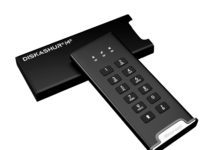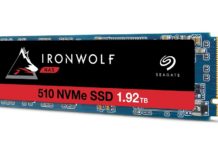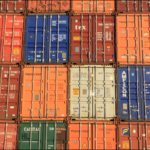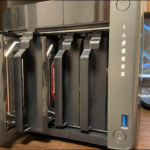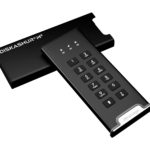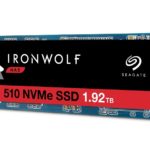Seagate’s latest entry into the spin-platters-because-they-make-storing-data-cheaper market is the rather excellent and exceedingly capacious 18TB IronWolf Pro. I once paid $700 for a 4GB drive. $550 for 18TB? Amazing.
Design and Specs
The IronWolf Pro 18TB is a 3.5-inch hard drive rotating at 7,200 rpm. It uses CMR (Conventional Magnetic Recording) opposed to SMR (Shingled Magnetic Recording) to store data. With SMR, tracks overlap and at times adjacent tracks must be read, stored, deleted then rewritten along with new data. As you might guess, this can lead to slowdowns when writing as the drive fills. A corollary effect is sometimes confusing storage products unaware of the phenomenon. CMR tracks don’t overlap.
The extra capacity of the 18TB drive is from an additional platter as the areal density remains the same. It’s likely to do so until heat-assisted recording arrives. There’s 256MB of DRAM cache on board all capacities of the IronWolf Pro hard drives, as well as a rotational vibration sensor to ward off issues due to a shaky environment induced by other drives spinning nearby. The drive draws approximately 8 watts active, up a little from the 7.6 watts of the 14TB and 16TB and the 7.8 watts drawn by the 12TB and 10TB.

Seagate warranties the IronWolf Pro for a full five years with three years of free data recovery should it not make it that far. HDD failure rates have plummeted over the last decade, but they’re still mechanical devices and… Stuff happens.
Seagate can’t quite match HGST in Backblaze’s reliability chart, however, less than 1.5% is much better than the 7% that the industry suffered a decade or so ago. It also doesn’t seem to stop Backblaze from buying Seagate. I’m not privy to the company’s buying formula, so I won’t speculate on their reasons.
Performance
The 18TB version of the IronWolf Pro sustained transfers just a hair faster that 12TB to 16TB versions I’ve used. That means it can sustain reads and writes at around 275MBps compared to 250MBps to 265MBps, with read seeks in the 12 millisecond range.

The story with the older CrystalDiskMark 6 tests are largely the same. I’ve included them for readers who are more familiar with the results.

AS SSD (yes, I know it’s not an HDD test, but it’s good with the seek times) always turns in slightly lower numbers.

Note that the performance numbers above are gathered with a drive that has otherwise never been written to. That means optimal results. You’ll experience slower writes and reads as the drive fills up.
It should go without saying that HDDs with important data on them should be backed up regularly. If you’re an end-user salivating over this IronWolf’s massive 18TB capacity, I’m basically telling you that you need a pair–a second HDD is the only practical way to back up this much data.
Vast and Fast
It seems like every time there’s a bump in performance and capacity, I use the words fast and vast. When I come up with something better, I’ll let you know. Until then, there’s nothing I can see to stop you from opting for maximum capacity and using the 18TB version of the IronWolf Pro. It’s incremental after all. Seagate recommends the Pros for SOHO and creatives, so make sure you employ them in pairs if you have important data on them.
Note that the plain IronWolfs are a bit cheaper than the Pros, but come with a shorter 3-year warranty and lower reliability figures. They’re also only available up to 12TB. For the small difference in money, I’m recommending the Pro version at any capacity. I’ve had far too many hard drives bite the dust to advise otherwise.




